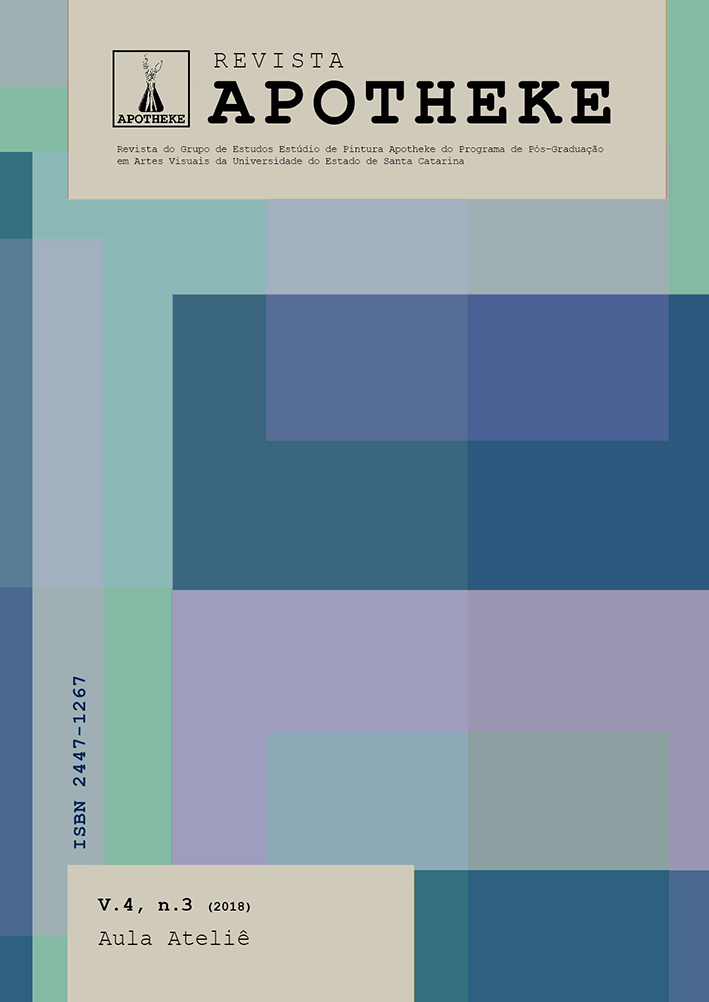A aula ateliê no contexto da formação inicial do professor de Artes Visuais
DOI:
https://doi.org/10.5965/24471267432018102Palavras-chave:
exeperiência , documentos de trabalho , artista professor , aula ateliêResumo
Este artigo objetiva tecer reflexões acerca do ensino e aprendizagem no espaço do ateliê de Artes Visuais, compreendendo este como um lugar de trânsito entre saberes artísticos e pedagógicos, assim como um lugar de deslocamento (no sentido de mudança) do ver/olhar/sentir do artista professor pesquisador. Compreende-se também este lugar como relevante para propiciar experiências através do processo criativo em Arte, bem como, a relação que esse indivíduo estabelece com seus documentos de trabalho. Para transitar por esses entre lugares sugiro perambular pelo processo criativo em Artes Visuais compreendendo a relevância da aula ateliê, para pensar o ser/estar do artista professor, que ao mesmo tempo que produz obra, também produz aula. Como principais eixos teóricos trago John Dewey (2010), Flávio Gonçalves (2000) e Jociele Lampert (2017).
Downloads
Referências
CORONA, Marilice. Pintura e documentos de trabalho: considerações sobre uma relação dinâmica. In: Anais XXX Colóquio do Comitê Brasileiro de História da Arte, CBHA, Petrópolis/RJ, 2010, pp. 1236-1245.
DEWEY, John. Arte como experiência. São Paulo: Martins Fontes, 2010.
GONÇALVES, Flávio. Où se trouve le dessin?: une idée de dessin dans l’art contemporain. Tese de Doutorado em Poéticas Visuais, Université de Paris I, Panthéon Sorbonne, Paris/France, 2000.
JESUS, Joaquim Alberto Luz de. (IN)VISIBILIDADES: um estudo sobre o devir do professor-artista no ensino em artes visuais. 2013. 260 f. Tese de Doutoramento em Educação Artística – Faculdade de Belas Artes, Universidade do Porto, Portugal. 2013.
KIFFER, Ana; REZENDE, Renato; BIDENT, Christophe (org.). Experiência e Arte Contemporânea. Rio de Janeiro: Editora Circuito, 2012.
LAMPERT, Jociele. O estúdio de pintura como laboratório de ensino e aprendizagem em Artes Visuais. Revista Matéria Prima, v.5, n. 3, set./dez. 2017, pp 60-65, ISSN 2182-9756 e-ISSN 2182-9829, disponível em:
http://materiaprima.fba.ul.pt/MP_v5_iss3.pdf.
SALLES, Cecilia Almeida. Gesto Inacabado, processo de criação artístico. 4. ed. São Paulo: Fapesp/Annablume, 2009.
SALLES, Cecilia Almeida. Redes da criação: construção da obra de arte. 2. ed. São Paulo: Horizonte, 2006.
Downloads
Publicado
Como Citar
Edição
Seção
Licença
Copyright (c) 2018 REVISTA APOTHEKE

Este trabalho está licenciado sob uma licença Creative Commons Attribution-NonCommercial 4.0 International License.
Os autores de trabalhos submetidos à Revista APOTHEKE autorizam sua publicação em meio físico e eletrônico, unicamente para fins acadêmicos, podendo ser reproduzidos desde que citada a fonte. Os mesmos, atestam sua originalidade, autoria e ineditismo.
Os artigos publicados pela revista são de uso gratuito, destinados a aplicações
acadêmicas e não comerciais. Os direitos autorais são todos cedidos à revista. Os artigos cujos autores são identificados representam a expressão do ponto de vista de seus autores e não a posição oficial da Revista Apotheke. O(s) autor(es) se compromete(m) a sempre que publicar material referente ao artigo publicado na Revista Apotheke mencionar a referida publicação da seguinte forma:
"Este artigo foi publicado originalmente pela revista Apotheke em seu volume (colocar o volume), número (colocar o número) no ano de (colocar o ano) e pode ser acessado em: http://www.revistas.udesc.br/index.php/APOTHEKE/index"
É responsabilidade dos autores a obtenção da permissão por escrito para usar em seus artigos materiais protegidos pela Lei de Direitos Autorais. A revista Apotheke não é responsável por quebras de direitos autorais feitas por seus colaboradores.
Os autores mantêm os direitos autorais e concedem à revista o direito de primeira publicação, com o trabalho licenciado sob Licença Creative Commons do tipo atribuição BY-NC:
Atribuição (BY): os licenciados têm o direito de copiar, distribuir, exibir e executar a obra e fazer trabalhos derivados dela, conquanto que deem créditos devidos ao autor ou licenciador, na maneira especificada por estes.
Uso Não comercial (NC): os licenciados podem copiar, distribuir, exibir e executar a obra e fazer trabalhos derivados dela, desde que sejam para fins não comerciais.
Após a publicação dos artigos, os autores permanecem com os direitos autorais e de republicação do texto.




